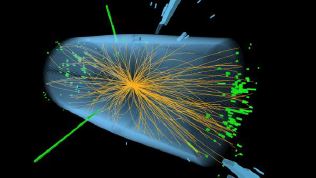What: Where: When:
Cost: | QuarkNet Data Camp Fermilab, Batavia IL July (usually second or third week) Applications for 2026 (12-17 July) are open! Click here. Applications are due on Monday, March 16 2026. All expenses paid, plus additional $600 stipend provided |
| Data Camp is designed to be an introductory workshop for both new and veteran teachers of physics and physical science. We welcome both those teachers who have little to no experience with QuarkNet and the world of high energy particle physics, and who are looking for a kickstart; as well as experienced QuarkNet teachers who have little experience with quantitative analysis of LHC data. |
We have tried to make this different from a traditional teacher workshop by putting emphasis on an authentic data analysis experience, in which the teachers get to play the student role by learning a challenging topic they may initially know very little about! In the beginning of the week, teachers will receive a real dataset from the Large Hadron Collider (LHC) experiment, and will work in small groups to analyze the dataset. Groups will use these data to determine the mass of particles produced during LHC proton-proton collisions and detected by the Compact Muon Solenoid (CMS) detector. Successful completion of this phase of the workshop culminates in each group presenting and explaining a plot of the invariant mass of a particular particle from a particular decay mode (e.g. mass of the W boson based on decays to electron and neutrino). Teachers will also visually interpret event display plots similar to those used by particle physicists at CERN, as depicted at right. |
Figure 1: A Higgs candidate event from the CMS detector! Source: cms-docdb.cern.ch. |
Following this exercise, teachers will have an opportunity to explore various classroom activities in the QuarkNet Data Portfolio (/data-portfolio) that help teachers incorporate high-energy physics concepts into their everyday lessons. Many of these activities utilize real data from CMS or other experiments such as ATLAS, LIGO, TOTEM and the QuarkNet cosmic ray detectors. Successful completion of this phase of the workshop will result in teachers developing an implementation plan that they can try with their students the following year. Up to three graduate credits are available for teachers who submit a formal implementation plan along with adaptations unique to their school or school district. (There is a cost and registration process for the graduate credit: if interested, please inquire about this ahead of time.) Throughout the week, teachers will also take various tours at Fermilab, including such destinations as the LINAC tunnel, MINOS experiment, the Neutrino Campus, the LHC remote operations center, and the Silicon Detector Facility. Teachers will also get to participate in presentations from both theoretical and experimental physicists who work on various projects at Fermilab. |
Figure 2: A sample histogram plot from one of the Data Portfolio activities. Source: quarknet.i2u2.org. |
Travel expenses (hotel and flights) are covered by QuarkNet; a per diem allowance is provided for meals; and each teacher receives a $600 stipend for the week.
|

